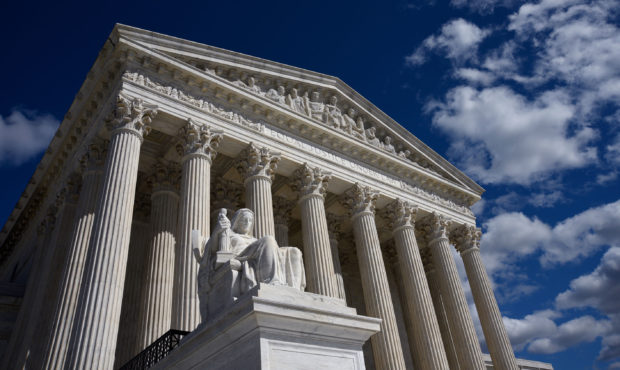Supreme Court rejects election law theory, sends First Amendment case back to lower court
Jun 27, 2023, 8:40 AM | Updated: 9:28 am

WASHINGTON, D.C. - APRIL 19, 2018: The U.S. Supreme Court Building in Washington, D.C., is the seat of the Supreme Court of the United States and the Judicial Branch of government. (Photo by Robert Alexander/Getty Images)
(Photo by Robert Alexander/Getty Images)
(CNN) — The Supreme Court said Tuesday that the North Carolina Supreme Court did not violate the elections clause of the US Constitution when it invalidated the state’s 2022 congressional map, rejecting a broad version of a controversial legal Independent State Legislature theory pushed by supporters of former President Donald Trump.
Chief Justice John Roberts wrote the 6-3 opinion.
The case had captured the nation’s attention because Republican lawmakers in North Carolina were asking the justices to adopt a long-dormant legal theory and hold that state courts and other state entities have a limited role in reviewing election rules established by state legislatures when it comes to federal elections.
“State courts retain the authority to apply state constitutional restraints when legislatures act under the power conferred upon them by the Elections Clause,” Roberts wrote.
The court allowed that federal courts can have some role supervising state courts in certain circumstances, with Roberts writing that “state courts do not have free rein.”
“Federal courts,” Roberts said, “must not abandon their duty to exercise judicial review.”
In another decision, the Court also wiped away a lower court decision upholding the stalking conviction of a Colorado man who sent hundreds of messages to a woman over Facebook.
The justices said the court had used the wrong standard in convicting the man and sent the case back down with a new test to apply to the case. The justices said it would suffice for prosecutors to show that the speaker was aware that his speech could be viewed as a threat and that the speech was reckless, even if not intentionally threatening.
This story is breaking and will be updated.
The-CNN-Wire
™ & © 2023 Cable News Network, Inc., a Warner Bros. Discovery Company. All rights reserved.













